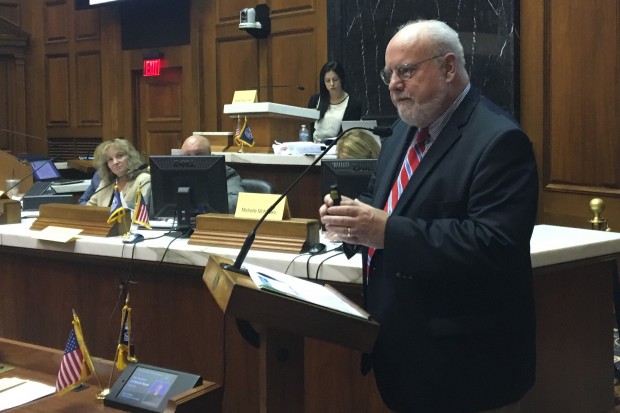Once Again, Indiana Plans To Launch A New Assessment In 1 Year

Testing expert Ed Roeber travelled to Indiana Tuesday to speak with the panel re-writing the state\’s assessment. Roeber encourage the panel to spend at least two years creating and implementing the new assessment system and not rush into it, like Indiana did in 2014. (Claire McInerny/Indiana Public Broadcasting)
When the 2017 General Assembly convenes in January, it will tackle one of the biggest education issues of the year: replacing the state’s assessment, the ISTEP+. Last session, the General Assembly passed a bill eliminating the current ISTEP+ and saying the replacement must be in effect by spring 2018.
This gives the legislature, the Department of Education, a test vendor and school districts less than a year to create and implement the new test.
It’s a road the state has been down before.
This started in March 2014, when Gov. Mike Pence and the legislature ditched Common Core standards and the PARCC assessment. The exit came without a contingency plan. And because of a waiver the state had with the federal government regarding the old No Child Left Behind law, they were legally obligated to give the test that year.
So the DOE and the State Board of Education wrote new standards in a few months and had test vendor, CTB, create an assessment to match.
Schools began preparing for test administration in Spring 2015, and many educators complained. The new 2015 version of the ISTEP+ was significantly longer than previous years. That’s because when a new test is created, best practice is to field test the questions on the test to make sure they are properly assessing a student’s knowledge. That field testing is usually spread out, but because of the short timeline, the pilot questions were tacked onto the real assessment, making it longer.
Parents and teachers were outraged at the amount of time students spent testing, and the discussion quickly turned into public accusations from the SBOE, the DOE and the governor’s office about whose fault it was.
Eventually, Governor Pence signed an executive order shortening the test, and the DOE worked with testing experts to figure out how to do make that happen.
Just over a year later, we’re back in a similar situation. If legislators keep the 2018 implementation deadline, here’s how the workflow of the test creation will play out: the General Assembly crafts a law that dictates how the new test looks. That isn’t finalized until late April or May of 2017 when the legislative session ends. Then the Department of Education, now under Jennifer McCormick, hires a test vendor to create the assessment. The vendor has a few months to create the test and the DOE has a few months to prepare schools for the change before it must be implemented spring 2018.
The legislation passed last year that eliminates the test, also created the ISTEP+ panel that was tasked with creating suggestions for re-writing the assessment.
The panel took testimony from Ed Roeber, a testing consultant based in Michigan who previously consulted with Indiana when the test was too long. He told the panel that the state should take at least two years to fully plan and implement a new test.
“When things get rushed, then you take shortcuts,” Roeber said at the October meeting of the ISTEP+ panel.
The panel issued its final report this week, and it does include a suggestion the state retain the current version another year and take two years to re-write and implement its replacement.
House Education Committee Chair Bob Behning, R-Indianapolis, and Senate Education Chair Dennis Kruse, R-Auburn, have both said they would discuss changing the deadline. The legislature could re-write that deadline during this year’s legislative session.